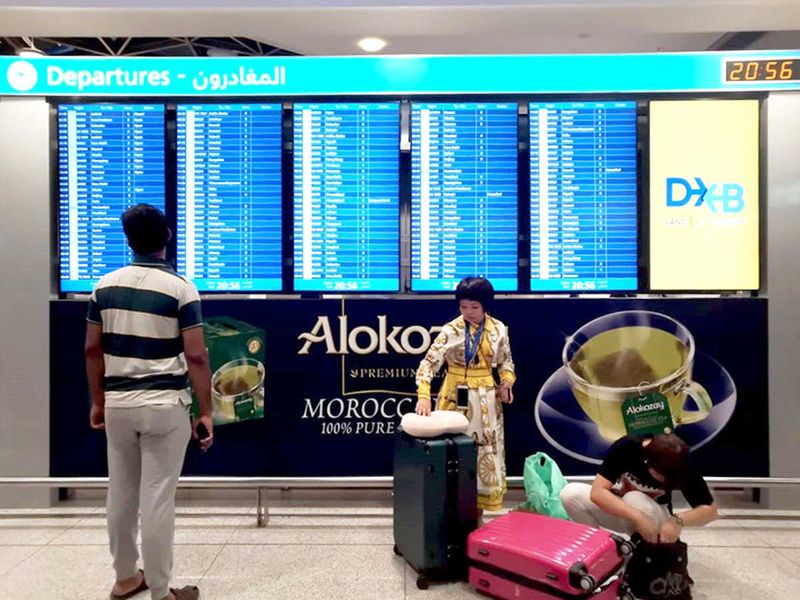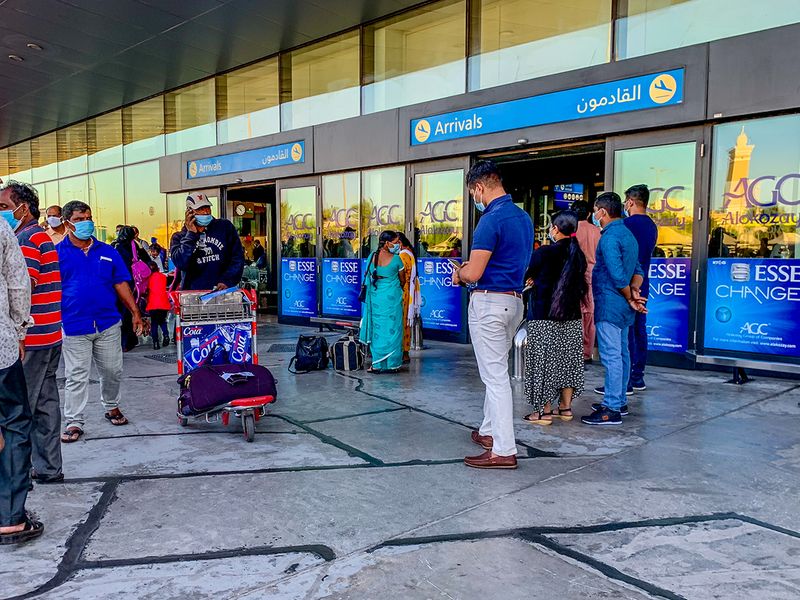
Flying to India from the UAE: If you are planning to travel between the UAE and India, you may be unsure of all the rules and regulations you need to follow – how many days prior to your travel should you take a PCR test? Do you need to take an advance test at all? Will you be asked to go into institutional quarantine in India or can you quarantine at home? Here is all you need to know about travelling to and from India.
There are some basic considerations you need to keep in mind.
1. How soon should you get a PCR test before you travel?
2. What are the institutional quarantine requirements for passengers arriving in India?
3. What are the requirements of the airline that you are choosing to travel from?
The following guidelines have been provided by UAE-based airlines Emirates, Etihad, FlyDubai and Air Arabia for routes to India.
Travelling from India to UAE
Who is allowed to travel?
According to Emirates Airlines, flights from India to Dubai will be limited only to the following passengers:
• UAE nationals
• ICA/GDRFA approved UAE residents; and
• Any Indian national or national of Nepal or Bhutan destined for UAE or any country in South America or Africa only and holding a valid visa of the destination country.
PCR test
• Most airlines offer relief for the test requirement for children under the age of 12 and people of determination. However, it is always advisable to check with your airlines before taking the tests.
• If flying with Emirates, you are required to take a COVID 19 RT-PCR (Reverse Transcription Polymerase Chain Reaction) test not more than 96 hours before departure. UAE will accept PCR test results from any lab authorised by the government of India, according to the airline’s website.
• The Indian Council of Medical Research (ICMR) has listed laboratories that perform the real time RT PCR test for COVID 19 across the country, which can be found here.
Also Read: Important News From Dubai: How to become an AirBnB host? Earn extra income on your home in 2021
• PCR test and certificate cost has to be borne by you, and it is important that you carry a copy of your negative COVID-19 PCR test result when travelling. Verification of the PCR test certificate will be managed by the airport team as part of documentation checks at the time of departure. Bring an official printed certificate – SMS and digital certificates are not accepted.
• If flying on Etihad Airways, it is mandatory to have a COVID-19 PCR test before you fly. Your test must be carried out a maximum of 96 hours before your flight departure time.
Where possible, the result must be issued by a Pure Health approved medical facility. You will find your closest approved medical facility at purehealth.ae. Children under 12 and people with severe and moderate disabilities are exempt from COVID-19 PCR testing.
If there are no approved Pure Health facilities close to you, you may arrange a COVID-19 PCR test from an ICMR testing facility. No other clinics will be accepted.
Online check-in
Etihad also advises passengers flying in from India to the UAE to check in online.
If you are a UAE resident flying to Abu Dhabi, visit uaeentry.ica.gov.ae
Travelling to India from UAE

Important update: Effective from December 23, 2021, until January 7, 2021, passengers originating in or transiting through the United Kingdom will not be permitted to enter India.
Travel to India is restricted to specified categories of passengers. You might also be required to take a COVID 19 PCR test before departure and undergo quarantine on arrival. Please check the requirements of your final destination before you travel.
Who can travel?
According to Emirates Airlines, flights to India will be limited to the following passengers:
• Indian Nationals or nationals of Nepal or Bhutan stranded in UAE or in any country in South America or Africa;
• All Overseas Citizen of India (OCI) cardholders and person of Indian origin (PIO) cardholders holding passports of any country; and
• UAE nationals and foreign nationals (from any country in South America or Africa only) intending to visit India for any purpose (including their dependents on appropriate category of dependent visa) except those on Tourist visa.
According to Etihad Airways, flights to India are limited to the following travellers only:
• Indian nationals stranded abroad.
• All Overseas Citizens of India (OCI) cardholders.
• UAE nationals (including diplomats) with a valid visa issued by an Indian Mission in any category covered under Ministry of Home Affairs (MOHA) guidelines dated June 30, 2020.
flydubai provides a list of the following categories of travellers who are currently permitted to travel from the UAE to India, updated on December 31, 2020:
• Citizens and residents of India
• UAE nationals (including diplomats) with a valid visa issued by an Indian Mission in any category covered under Ministry of Home Affairs (MOHA) guidelines dated June 30, 2020.
• Citizens of Nepal and Bhutan
• Passengers with an Overseas Citizen of India (OCI) card or booklet
• Passengers with a Persons of Indian Origin (PIO) card
• Students/Minors if one of the parents is an Indian citizen or OCI card holder
• Spouses of Indian citizens
• Single parents of a minor who is an Indian citizen or OCI card holder
• Passengers returning from a neighboring country via India to their country of residence
• Passengers with diplomatic, official, UN/International Organisations or project visas
• Passengers with a non-Tourist visa issued from India
• Passengers with a visa or an e-visa issued after June 30, 2020 by India.
• Passengers are not allowed to transit Delhi (DEL).
• Visas and e-visas issued before June 30, 2020 are invalidated except for Diplomatic, official, UN/International Organizations or project visas/all category of Employment visas; airline crew; Business visa (excluding B-3 visa for sports).
• Ministry of External Affairs (MEA) staff
• Foreign diplomats and their family members
• Foreign citizens holding medical visas issued by the Embassy of India in their country of origin
• Citizens of Afghanistan, Bahrain, Bangladesh, Bhutan, Canada, Iraq, Japan, Kenya, Maldives, Nigeria, Oman, Qatar, USA, Ukraine and United Arab Emirates with an Overseas Citizen of India (OCI) card or booklet arriving from their country of nationality
• Citizens of United Kingdom with an Overseas Citizen of India (OCI) card or booklet arriving from the United Kingdom
• Passengers with an Overseas Citizen of India (OCI) card or booklet whose journey originated from the United Kingdom
• Passengers with an Overseas Citizen of India (OCI) card or booklet arriving from Ethiopia, France, Germany, Netherlands, Rwanda or Tanzania
According to Air Arabia, the following passengers are allowed to travel to India:
• Indian nationals
• Nepal and Bhutan nationals
• Overseas Citizen of India (OCI) and PIO cardholders
• Foreign nationals (including dependents) on any visa except on Tourist visa.

Steps to follow
1. Fill out the self-reporting or self-declaration form – All passengers must fill the self-reporting form on the website of the airport they are travelling to, at least 72 hours before the scheduled departure. Passengers will receive an approval code that must be presented at the time of departure.
2. Check airport requirements – Find out the specific requirements based on the Indian state you are landing in, as well as the airport’s requirements. After restrictions were implemented recently, following the emergence of a new coronavirus strain, each Indian state has put in place specific requirements for institutional quarantine, who can exempt themselves from it and whether passengers will be able to take connecting flights within the country to other national airports. These guidelines are regularly updated and it is advisable to check the airport’s website to get the latest requirements before you book your ticket.
3. Conduct a COVID-19 test before you travel – Some international airports in India do not have a mandatory requirement for a pre-travel COVID-19 negative test result. However, it may help you in getting an exemption from institutional quarantine, in some states. A state-wise breakdown of travel requirements is available below.
4. Keep printed copies – It is always advisable to keep printed hard copies of your negative COVID-19 PCR test, any self-declaration forms or special request forms you may have filled in. Some airports may not accept digital copies like those on your mobile phone.
5. Quarantine guidelines – Each state has specific regulations for quarantine requirements – whether at home or a state institution – quarantine exemption rules and eligibility.
What are the requirements across India?
The guidelines shared by Emirates Airlines on its website, updated on January 5, 2021, provide the following state-wise breakdown of travel requirements for passengers from the UAE.
Ahmedabad (AMD)
Passengers with final destination in Gujarat only will be accepted.
COVID 19 testing requirements
Passengers must carry printed copy of negative COVID 19 RT PCR certificate for test conducted within 96 hours of departure. This excludes children below 10 years of age.
Also Read: Indian Railways: IRCTC brings tour package to roam South India in the new year, fare is extremely low
Quarantine guidelines
All asymptomatic passengers will undergo a mandatory 14-day home quarantine.
Bengaluru (BLR)
All passengers travelling to Bengaluru (BLR) must download the Aarogya setu app, Quarantine Watch app and Apthamitra app on their mobile devices.
COVID 19 testing requirements
Passengers should carry printed copy of negative COVID 19 RT-PCR certificate for a test conducted within 72 hours of departure. Passengers without this certificate will also have an option to undergo this test upon arrival at their own cost. This excludes children below 10 years of age.
Quarantine guidelines
All asymptomatic passengers will undergo a mandatory 14-day home quarantine.
Quarantine exemptions
Business/short term travellers to Bengaluru with a negative COVID 19 RT-PCR test report are exempted from quarantine. Such passengers must submit a declaration of authenticity of the test report and will be liable for criminal prosecution if found otherwise. The test report must be presented upon arrival at BLR Airport.
Students taking exams in Karnataka will be exempted from home quarantine if they undergo Rapid Antigen testing with a negative result or if they submit a negative COVID 19 RT-PCR test report for a test conducted within 72 hours of departure.
Chennai (MAA)
All passengers must ensure TN e pass (Tamil Nadu government’s online registration portal for travellers) is applied and details are ready to be shown to state health authorities. You can register for the pass here.
You may need to contact your airline to update the details on the TN e-pass 48 hours before departure.
All passenger who are cleared by state health officials are permitted to use any mode to travel home including on domestic flights.
Transit passengers who are travelling to other states have to apply for a fresh e pass on arrival and follow the other state’s process when connecting on to a domestic flight. Transfer facility of passengers and baggage is currently not available.
COVID 19 testing requirements
Passengers must carry a printed copy of a negative COVID 19 RT-PCR certificate for the test conducted within 96 hours prior to their arrival. This excludes infants below six months of age.
Quarantine guidelines
All asymptomatic passengers will undergo a mandatory 14-day home quarantine.
Delhi (DEL)
COVID 19 testing requirements
It is not mandatory to take COVID-19 PCR test before departure. However, it would be necessary if you want to request for an exemption from institutional quarantine.
Quarantine guidelines
All passengers must submit an undertaking form on the online portal – www.newdelhiairport.in – agreeing to undergo a mandatory seven-day paid institutional quarantine at their own cost, followed by a seven-day isolation at home with self-monitoring of health.
Quarantine exemptions
Passengers may request exemption from institutional quarantine by submitting a negative COVID-19 RT-PCR test report on arrival. This test should have been conducted within 72 hours of the start of their journey. The test report should be uploaded for exemption under Air Suvidha on the online portal for consideration. Each passenger must also submit a declaration with respect to authenticity of the report and will be liable for criminal prosecution if found otherwise. The test report could also be presented upon arrival at the point of entry airport in India.
Hyderabad (HYD)
COVID-19 testing requirements
It is not mandatory to take COVID-19 PCR test before departure
Quarantine guidelines
All passengers must submit an undertaking form on the online portal agreeing to undergo a mandatory seven-day paid institutional quarantine at their own cost, followed by a seven-day isolation at home with self-monitoring of health.
Quarantine exemptions
Passengers travelling to Hyderabad for business reasons and having a negative COVID 19 RT-PCR test conducted less than 72 hours prior to departure shall be exempted from the requirement of home or institutional quarantine. However, the passengers should return within four days of arrival as evidenced by confirmed return tickets.
Passengers may request exemption from institutional quarantine by submitting a negative COVID 19 RT PCR test report on arrival. This test should have been conducted within 72 hours of the start of their journey. The test report should be uploaded for exemption under Air Suvidha on the online portal for consideration. Each passenger must also submit a declaration with respect to the authenticity of the report and will be liable for criminal prosecution if found otherwise. The test report could also be presented upon arrival at the point of entry airport in India.
Kerala (COK/TRV)
All passengers travelling to Kerala must also update their details online at least two days before departure.
COVID 19 testing requirements
It is not mandatory to take COVID 19 PCR test before departure.
Quarantine guidelines
All asymptomatic passengers will undergo a mandatory 14-day home quarantine.
Quarantine Exemptions
Passengers travelling to Kerala may undergo COVID 19 RT PCR test on the seventh day of arrival and if they test negative, further quarantine of seven days is optional.
Kolkata (CCU)
COVID 19 testing requirements
Passengers must carry a printed hard copy of the negative COVID 19 RT-PCR certificate for a test conducted within 72 hours of departure. Children under the age of three years are exempted.
Passengers must upload negative COVID 19 RT-PCR test result on the Air Suvidha portal up to four hours prior to the flight departure.
Quarantine guidelines
All asymptomatic passengers will undergo a mandatory 14-day home quarantine.
Mumbai (BOM)
COVID 19 testing requirements
It is not mandatory to take a COVID 19 PCR test before departure. However, having a negative test result may help you if you are going to take a connecting flight within India.
Quarantine guidelines
All passengers must submit an undertaking form on the Air Suvidha online portal, agreeing to undergo mandatory seven-day paid institutional quarantine at their own cost, followed by seven days’ isolation at home with self monitoring of health. On arrival, no COVID 19 RT PCR test will be conducted. However, COVID-19 RT PCR test will be conducted during the fifth to seventh day at the hotel and all related costs are to be borne by the passenger.
Quarantine exemptions
All passengers travelling to Mumbai (BOM) and connecting on a domestic flight to a destination out of Maharashtra will be exempt from the above requirement, provided they have negative COVID-19 RT-PCR test conducted within 72 hours of boarding the flight. The passenger may also choose to undergo the COVID-19 RT-PCR test at the airport itself, however only after the negative results are received the passenger will be allowed to proceed for the domestic flight.
Passengers under the following exceptional circumstances would be considered for exemption of the seven-day mandatory institutional quarantine. Decision would be taken after arrival on verification of following reasons with proof of documents.
• Pregnant woman in advanced stage of pregnancy
• Death in immediate family.
• General Quarantine Exemptions for all airports except Mumbai (BOM)
Home quarantine of 14 days may be allowed only for compelling reasons or cases of human distress such as pregnancy, death in the family, serious illness and parent(s) with children 10 years old and younger. Passengers must apply for exemption under Air Suvidha on the online portal at least 72 hours before boarding.



